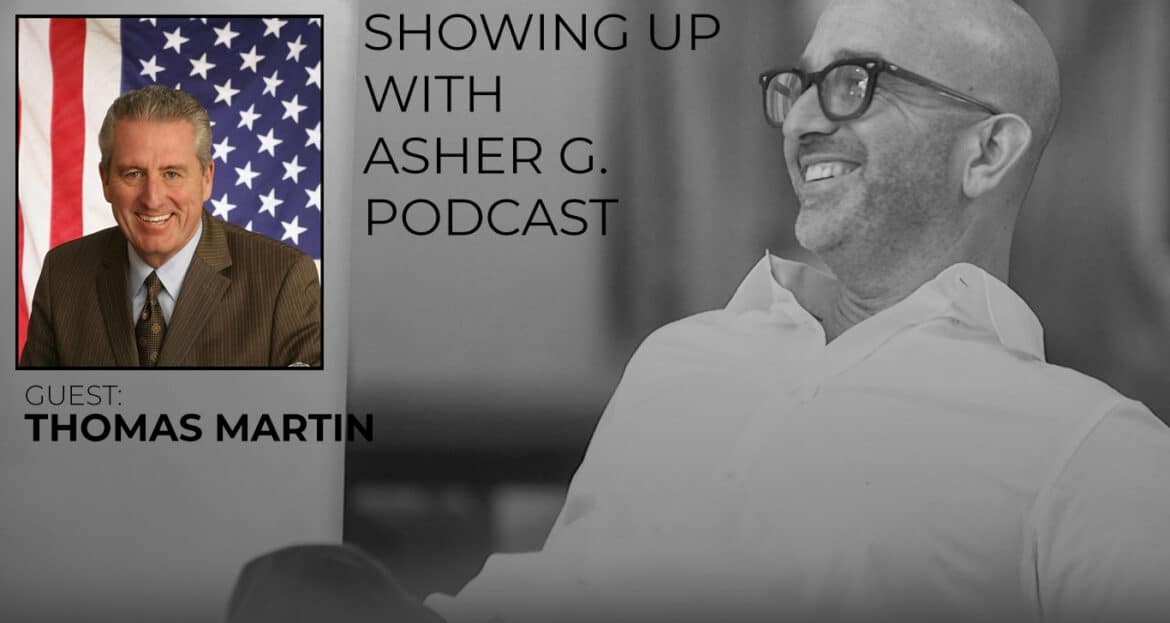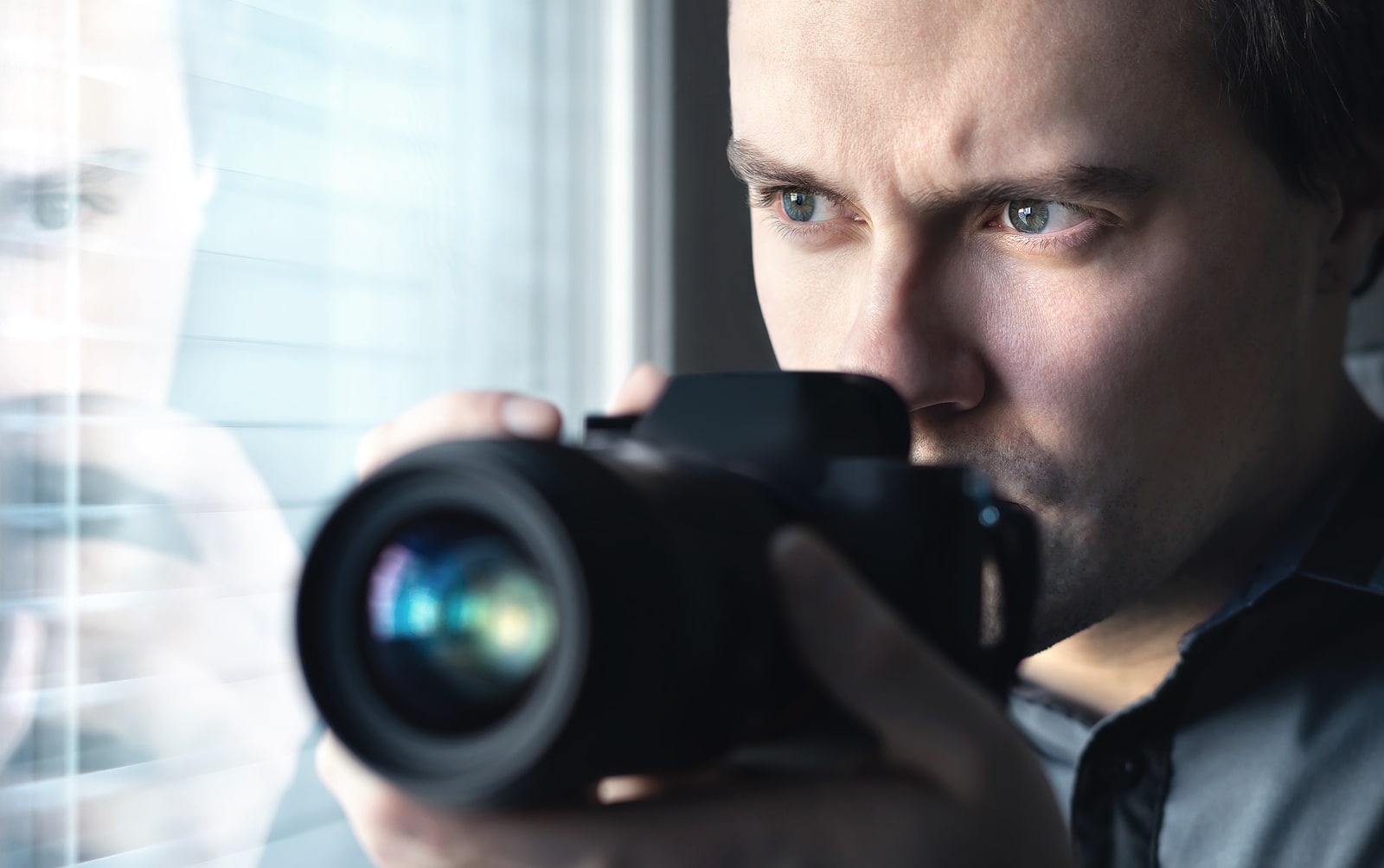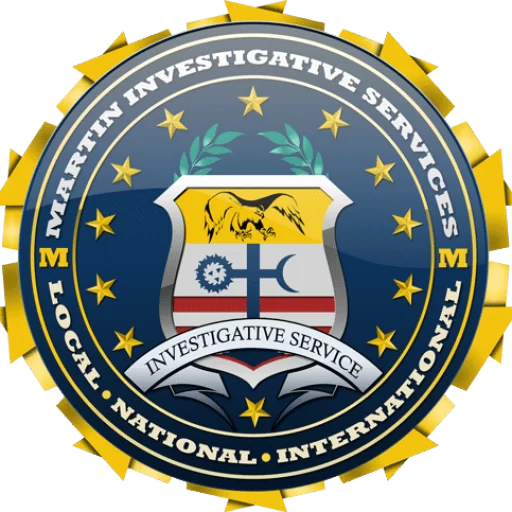Private Investigator Near Me
Thomas Martin Interviewed on ‘Showing Up’ with Asher Gottesman
Thomas G. Martin was recently featured on ‘Showing Up’ with Asher Gottesman.
Overview: Thomas Martin wanted to become a priest but he felt he could better help people as a federal agent. And the story just gets more interesting from there. He joins us today to talk about working as a DEA Agent, working in Israel, the complicated parts of being a private investigator from an emotional standpoint, the hardest cases to investigate, how he quiets his mind, why his job is more Columbo than Magnum PI, his advice for anyone who wants to become a private investigator, and so much more.
Our team of private investigators are former Federal agents with the FBI, DEA, IRS, or Secret Service. We can help you throughout the continental USA. Call our PI today. We can help!


Asher (00:20):
And welcome to showing up with Asher Godman. If you like to show, please subscribe, rate, and review, or simply share with a friend. You can follow me on the Instagram at the Asher G and I respond. Private investigators are the kind of people we normally hear about in movies and on television shows, but we rarely get to really get to know them. Well today have an incredible private investigator on his name is Thomas Martin. He is here to talk about investigating and himself. Welcome Thomas
Thomas (00:51):
Asher. Thanks for having me. I look forward to our conversation.
Asher (00:55):
So tell, tell me how you became a private investigator. Let’s just start with that.
Thomas (01:00):
Well, I, I didn’t take normal route for sure. I started out after high school, I decided I was going to become a Catholic priest and that lasted for four years. And I decided maybe the best place to learn how to become a priest is not in the seminary. So I went to the east coast where I had a cousin who was as a priest in New Jersey. There I was thrown into a world I had never seen before with drugs and alcohol. I taught school in Harlem and Patterson, New Jersey. So I had this kind of crazy idea that maybe I could do a lot more for people if I, you know, became a federal agent. And so as the story goes, I traded in my collar, my rosary beads, and Bible. And the next thing I knew, I was at the department of justice.
Thomas (01:47):
Luckily got I accepted <laugh> and I now had a gun, a badge and credentials. So in a period of three months, it was a pretty life changing events. So I then went on the, what they call when you go to the department of, in those days, you can go on what fast track or just what they call just the regular progression. So I decided to go on fast track and I was set on a 10 year path to maybe become the deputy administrator. And I had a great 12 years until I got injured and had to retire. I worked undercover for three years as I traveled the world, I went to a hundred foreign countries. Oh, wow. Yeah. And, and including a, a story, I hope to be able to tell you about the teaching, the Israeli special forces when I was 28 years old. And that was, that was, that was kinda like terrifying for me. <Laugh> These are the same. And guys that just went on and took the terrorists off the Sabena airplane, and I’m sitting there talking with them, like, I, knew anything more than they did.
Asher (02:53):
Wow, let, let’s stop. I’m gonna stop you there. Let’s share that story. Cause you know you know, you know this, but I just got back from Israel and you know, I have, as I have a deep affinity for Israel. And so, you know, I’m super grateful for all that America has done and continues to do so. The joint task forces are huge for me. So share that 28 years old. I mean, so much we got already, you’re gonna be a priest, became, became a federal investigator you know, and at 28 years old, you’re teaching Israeli special forces. Tell us about that experience.
Thomas (03:29):
Well , with the special emphasis on teaching, I think they very kind to say that I was teaching them anything. What happened with me then, when you get to the department of justice and I was in the drug enforcement administration those days, it was called the bureau of narcotics. So the first thing you have to do is, is not look like a cop and you have to pay your dues and work undercover. And I kind of look like a cop. So I had to end up, you know, growing a beard, which looked horrible and grew my hair long and rode a motorcycle. And so that was my introduction into the war world of dope buying heroin cocaine on the streets of Las Vegas and Hawaii and Los Angeles. After three years of that, I, I applied for a position at international training.
Thomas (04:12):
And to this day, I’m not sure two of us went back from Los Angeles and we had young families. We really didn’t want to go. It was a chance to, to go back to DC and see our friends. And unfortunately, or fortunately, as you look at the story, the we both got accepted and we then proceeded for the next two and a half, three years to travel, you know, to Bogota Columbia. And one day we’d be in Paris. The next day we’d be Johannesburg and we’d go to Asia and all this was teaching law enforcement and drug policies to our contemporaries in those, in those countries. And one of the trips in 1974, myself, and one of the agents named Ron went to set up a school in in Tel Aviv. And, you know, I’ve heard a lot about it.
Thomas (05:03):
Of course I had some background in the seminary, but what, what a, what a, just a, a moment in time that was frozen when I was there talking to them and setting up the school they were very generous in their, you know, compliments and, and they’re not outwardly laughing at two 28 year old, fairly rookie guys and talking to guys who, you know, I think it was 72 when posed as I’m sure if it was mechanics or actually I think it was mechanics. And they went on the plane. That was the first time ever in the world that people who were hostages were actually saved. And I think only one person was injured because the gun went off accidentally. So that was some fond memories till I got to go back a couple years ago. I took my wife of now 51 years there. We had a great time and it’s just a wonderful place to visit. I always remember the guide at the end of the tour. I said, did I miss anything? He goes, we probably should have went to Masada. I went, oh my gosh, I didn’t even think of that. So off we went to Masada. So I’ve got a great guide, if any of your listeners ever want, he’s taken care of a lot of my family members. So it’s just a wonderful place to visit.
Thomas (06:31):
Did we lose each other?
Asher (06:34):
I I’m so sorry. Yes, we’re here. I, yes. So I, I was saying that when I go to Israel, I do an hour from a Jewish perspective in the old city of Jerusalem, an hour from a Muslim perspective and an hour from a Christian perspective. Oh, wow. It’s, it’s very it’s, it’s, I think it’s extremely important that everybody understands and hears each other’s narratives. So I find it to be, you know, better an official when we were, when we become good listeners, you know, if you wanna, I would love, you know, if you were willing to share and go back to how does somebody who wants to be a priest become a fed, you know, a federal investigator?
Thomas (07:18):
Well, it was clearly by accident. It was no grandiose plan. I did not have a lot of planning in my early life. I had great parents and my dad was a milkman and my mom was a waitress. Neither one of them went to high school. So the, the main guidance is my brothers and sister will tell you, at least for me, was it wasn’t gonna be Martin and son’s milk routes. Cause we all worked those milk routes. It’s, it’s just, it’s just too hard of living. So I decided I needed to go to college and I, I, I wanted to go to a couple schools here, UCLA and, and Loyola, but it was a question of finances. And just about a month before I was gonna go off to college I had this that maybe I should try the seminary and which made my mother very, very happy and she’s a very devout catholic and so, so off I went and it, it was, it was, you know, a great experience.
Thomas (08:15):
Back on it as some that I may have not gotten in college know, I regular college, especially being, you know, maybe a little more sympathetic to the plight, to the people that I was arresting and the people I got to meet on the way. And certainly in my private practice of, of a private investigator over the last 40 years, it’s certainly especially in some of the marital cases and, and the murder cases and some of the tough things that we have to do every day. It’s, it’s real easy to put on the bravado and the macho and, you know, think you have some kind of swagger with a gun, but it really doesn’t work in the private sector as it doesn’t work very well as we can see sometimes in the law enforcement community today.
Asher (09:03):
Sure. I mean, yeah. And that’s, I think that’s really important if you could talk about, you know, the emotional involvement of, you know, of specifically you, cuz I wanna, you know, this is about you, but yet in general, you know, I think we, we so easily see the, and I, I don’t wanna defend any horrible behavior, but we so easily see the negative behavior. We don’t understand how emotional it gets, you know, so, and how difficult it must be. So I’d love if you’d be willing to share and speak to that as well.
Thomas (09:40):
Well, I think what most people envision of private investigators are at least that’s what, when I interviewed or been on shows or just talked to clients, they, they, the, the picture of a private investigator is they a person who is, you know, has a top coat, a fedora and a pipe. And he is looking around a corner peering in some seedy fashion to catch the, your client’s husband or wife cheating. Although we do that a lot, it only represents about 8% of our business. I think to connect the seminary days to, to the private investigator days, when you bring somebody into your office and you bring them the bad news. In other words, you have the videotape of the husband or the wife meeting somebody else. And I think it was my third or fourth week that I had a case back in 1981, that a, I showed that the videotape and the reports to my client.
Thomas (10:36):
And she literally got sick in my office. That’s something I wasn’t prepared for. And it dawned on me right then that, you know, maybe there’s a better way to bring the news, maybe a softer way to bring it. And that I kind of developed over the years and have mentored hundreds of private invest, or just say, Hey, after you, you master the art of interviewing and giving that news, then that’s when our job may really begin in getting them a good lawyer and getting them good counselors, taking care of the kids understanding that they’re probably gonna be two husbands and wives and six kids and four dogs involved in this divorce and, and, and trying to just gingerly you know, just being a little more, I guess, visceral than trying to be smart and, and, and talk it out. Cause these are really hard emotions.
Thomas (11:35):
They’re raw and, you know, lives get turned upside down. And it’s like a death in the family. So there, there’s not a lot of private investigators who bring that. Mm-Hmm <affirmative>, and, and it’s unfortunate because it could make, it could make your life a lot easier. And so most guys just, and, and I’m pretty hard on the industry. I don’t know, I’m not apologizing for anything that I would tell you or your listeners. But it’s a lot easier if you, if you know how to, to bring the news and, and across the board, most private investigators, 80% of our clients are women and obviously 20% are men. And so it’s a balancing act because now either in your office and a third don’t know what to do a third, want to get divorced and a third want to go to counseling. When it’s the women we catch, of course, all the macho guys who cannot look at their wives anymore and feel their soiled in, and it’s 99% get divorced. So it’s, it’s really, really important if there’s any private investigators out there. And I mean, I’ve, I’ve written it in books, I’ve written, I’ve written it in blogs, I’ve lectured on it. <Laugh> and, and there are some really good private investigators. And, and I would think before I hired one for that small piece of what we do every day I’d go and size the person up and, and see if he’s leaving his bravado at the door.
Asher (13:05):
It’s so important that they remember that they’re dealing with people, right? Oh my God. People, and you know, it’s not, it’s not about, you know, the cat and mouse game.
Thomas (13:18):
No, it’s real life. I mean, I’ve had seven of my female clients die in the last 40 years because the husband brought them a gift home. And, you know, this was in the eighties and nineties, but aids was real prevalent. So, you know, you have a client sitting in your office and, you know, all of a sudden you’re to the funeral, that’s real life
Asher (13:38):
Sure. Wow. That is real life. So tell us, what are the hardest cases for you to investigate?
Thomas (13:47):
The hardest cases for us would probably be when we either have a murder case and, and I’ve worked murder cases, both ways where the attorneys will hire us to sit at the table or somebody has been accused of murder. And I’m pretty sure they did it based on the evidence. And then everybody deserves a defense. And so if we choose to do that, then you know, we, we, we do our best and present, not whatever evidence there is. The other time is when you have a family member come to us, and this is happening in one of the areas of our business, where it’s increasing with defund the police. We’re, we’re seeing almost a hundred fold every year when we normally have 25 or 30 murder cases, we’re getting literally hundreds of people coming to us and saying, across the country saying, can you help solve?
Thomas (14:48):
Who killed my daughter? Can you help me solve? Who shot my dad? I come from a law enforcement family, you know, so I get it. I got a brother that was on LAPD for 25 years. I had another brother who was on the LA sheriffs for 30 years. I have a brother that just retired as a chief of police in Santa Maria. And so I, I get the they’re all younger than me. I get it. I grew up with them and I, I watched them grow and you can’t take everybody and put ’em in one basket, but with this overworked, underpaid and, you know, no overtime combine that with defund the police and the spirit and the air is just out of their balloon. So to speak just simple cases, aren’t even gonna solved home robberies, aren’t even getting solved. I mean, sometimes a car accident, they just aren’t even responding. So can you imagine when a somebody in your family gets merged, so those, those, you gotta have a, a special way about you and, and bring the most important thing in private investigations. And that’s the art of interview and interrogation without that, you’re not gonna make it.
Asher (16:02):
Sure. If you could think back, what was the single hardest case for you personally to investigate? Obviously, I know you can’t speak about specific names or anything, but in general,
Thomas (16:15):
Well, I can speak about specific names. I’ve been very fortunate over, over the course of my career. I went up against Anthony Pellicano who just got out of jail, a very well-known private investigator. Anthony and I did battle in the nineties before you know, he unfortunately got arrested and, and went away to prison. He would be the guy that would be very proud of saying that this particular movie star, Michael Jackson was, you know his client where I’m a might be in the other end of that case where my client might be one of the victims, alleged Michael Jackson, but I wouldn’t talk about it. I tried to keep that. And so that kind of the word got out in the early eighties, that we were both pretty talented.
Thomas (17:08):
He was really talented in doing wire taps <laugh> which unfortunately is against law and he went to prison. I mean, and I knew I had very famous people with one name and I, we would tell them, do not talk, Anthony might be on the other side, he might do something. And I I’m just alleging that he might do it. And but the clients would, would just go off and not listen to us. We’d get our hat handed to us in court. Probably the hardest case for me has been it’s not a murder case. It’s the Derek Seehausen case. Your listeners can Google that. Derek was the number one medical student in the United States about eight or nine years ago. And one day he, we have videotape of him.
Thomas (18:00):
He went to a few houses, met some people. Then he got on a bus and he went into Los Angeles and he disappeared <affirmative> and he has not been found to this day. And it’s one of those cases that eat at me. I think I’m the only guy on the planet that thinks he’s alive. And the reason for that is my, we had about seven or eight of my investigators. I’m talking guys that work for me are FBI DEA, IRS secret service. You know, as we say, we got a couple bone heads, but not too many. And these are world class investigators. The family retained us. We did a lot of extra work because he was such a kind decent person. I could never understand that he would put his family by killing himself. But I’m the only one Asher who thinks that.
Thomas (18:52):
I use to be a profiler. I think I was a second or third profiler in DOJ/DEA. You gotta work pretty hard for 10 years before they even consider you that. I am not bringing that up in a bragging way. I just bring it that skill level in, in sitting across from his girlfriend, his roommates, medical students, et cetera, it was painfully obvious to me unless I just totally misread it, that this is the guy who would not do this. And so every year, you know, I’ve offered $25,000 of my own money to, if anybody has a lead and we do get leads, but none of them have panned out. So you know, I, I, the kind of the smart alky way to look at it is I’ve never had a, a victim, you know, kill himself and then bury himself. So nobody body’s been found. It’s not a false hope and we’re not taking any more money to work the case. It’s purely from an investigative, you know, 50 years of doing this, that one day, I think I I’m hoping we will, we’ll get to see each other, but that, that, that that’s a gut wrenching case. I think about that case almost every day.
Asher (20:14):
Well, you know, it says a lot about your character that you do think so much about these cases and how, how important they are to you, which leads me to, how to then how do you then take care of yourself? You know, I it’s must be so hard. I mean, murder, you know, infidelity, et cetera, et cetera, et cetera. And now this missing person that you, you know, everybody’s given up on, but yourself, how do you take care of yourself?
Thomas (20:46):
Well, for me I, I often tell people when asked that question, I don’t golf very well and my wife doesn’t want me at home. So I think pace for me, you know, just the pace of life. I try to look at things and, and not get too excited or too down. I try to make sure spiritually every week I look forward to the one or two hours that I go to church and just sit there and it’s all quiet. And I just kind of listen, which is, is sometimes hard for some egomaniac agents. I would put the myself in that category in the early days. I think just to sit there, as you said earlier in your show, just to listen and be quiet, it’s really hard.
Thomas (21:40):
And then I take that and, and I think what I’m guided on most is my kind of my life’s mantra is that everything that I do or my people do, whatever kind of case is a simple background case a simple asset search going to trial when somebody’s accused of horrendous things or helping a family, everything, we do, you, if you want some pressure, this will go, this will give it to you. That everything we do is gonna be front of a jury or a judge one day. So everybody goes, oh my God, how do you stand that pressure? I said, oh, I don’t, that’s not pressure for me. That’s a gift. I don’t know if it’s a gift from God, a gift from my guardian angel or just a gift, but that slows everything down so that you do take care of yourself and you pace it out and you don’t rush it and you don’t take shortcuts.
Thomas (22:38):
You dot your eyes, you cross your Ts and, and you make sure you do everything in a methodic well, methodical way. And I often am asked, you know, is, is this more like, is this being a private investigator? Is it like Magnum? Or is it the Rockford files? I go, my job. And every day it’s more like Colombo than it is Magnum. Cause it is a plotting step by step process. And, you know, don’t wanna put anybody in any worse shape than they are. And so those are kind of the guiding passions for me. And as we work every day and do our thing,
Asher (23:22):
What advice would you give to somebody who wants to become, or is considering becoming a private investigator or if for that matter federal law enforcement officer?
Thomas (23:33):
Well, if you’re going to go into law enforcement, my suggestion would be that you’d consider the three letter agencies, the federal agencies. There’s a number of reasons for that. The biggest one is that you can control your environment. Although there are shootouts, injuries that you get. I’ve got pins and screws and operations that I can attest to those days. I think I would go into a federal law enforcement versus the everyday police activity. If you’re going to become a private investigator, I think you should, first of all, call the, the bureau of licensing in your state, find out what the qualifications are. Most states you gotta have 6,000 hours or three years of experience. Sometimes it’ll eliminate that if you have a degree. I wouldn’t go to any schools because all the schools are phony, baloney.
Thomas (24:34):
They just take your money. There’s not one school out there will help you get your license. You can take that to the bank, so don’t pay any money. So get your degree. Then now you got the, the chicken and the egg thing again, how do I get experience if nobody will hire me because I don’t have a license? Well, there’s ways each state has one way you can work for just one attorney, or you can work for an investigator. If he puts you, you on your payroll. And then once you get your license, then you wanna really key in on, you know, most people can do surveillance. That’s an acquired skill. Most people can do a report. Most people can do a background. We’ve got, I mean, we have our own in-house computer system at Martin investigative services, which we, you know, do all the assets and stuff.
Thomas (25:20):
And there are other agencies like us that have great systems also, but the, to being a, the key to being separating you, there’s a hundred thousand private investigators in the country. Now, if there’s more than a thousand, making a good living at it, I’m probably lying to ask you. So the key is interview and interrogation, that’s everything. And if you’re a female get into the business, and for two reasons, one, we have a lack of females, and second reason is let’s say me and Mary have the exact same skills. And if you believe what I say that interview and interrogation is the most important tool to bring to the game. Then let’s be realistic. When Tom interviews, a man it’s mono on mono. I have to deescalate it, because he’s probably gonna be hostile. Even if it’s a friendly thing.
Thomas (26:19):
If I’m interviewing a female, that female if I’m not careful, she may be very guarded. She does wanna be hit upon. She doesn’t wanna tell private stuff where if you take Mary who has the same skills as Tom Martin and she’s interviewing the man, the man’s gonna talk as, you know, what off, blah, blah, blah, blah, blah, blah, blah. He’s gonna try and impress her. If she talks to another female, there’s not that conflict. There’s not that negativity to the other person. And it’s more friendly. And so that’s why I think it was one year ago that the FBI graduating class was all girls.
Thomas (27:03):
I didn’t come up with the idea <laugh>. I had the second female agent at the department of justice and I was a guy who said they have no place in law enforcement. How wrong was I? But she ended up being, if truth be told, a better agent than I was, and I was her boss. So, you know, I, that was in 76 or 77. So once you see that picture unfold in front of your eyes, then maybe you start to learn that not only is there a place, there’s a really big place for them. It applies alsoto PIs,
Asher (27:42):
Love it, you know, and I, I also love the fact that you’re willing to admit when you were wrong.
Thomas (27:48):
Well, I’ve had some practice at that. <Laugh>. A lot of practice at that. It’s a great career. I would just make sure you’re prepared and, and the monies not too bad if you’re getting into the game right now. It’s just hard to get good people.
Asher (28:11):
Right. Well, the beautiful thing is you love what you’re do, and I can hear the passion in, in your voice and you show up for it in a beautiful way, with integrity, with honesty, with transparency, and you take it seriously. You not looking just to solve the case. You’re taking into account that you’re dealing with humans. So, you know, all investigators who like were like, you that’d be beautiful.
Thomas (28:38):
Well, I appreciate the kind words. I wish I could say the last 40 years as a PI I have encompassed all of those things, but it was a work in progress. At least I figured it out early on. This has been very fortunate.
Asher (28:56):
Well, thank you so much for being on this was really, really wonderful and keep on doing what you’re doing and, you know, in a way you’re saving lives. So please keep on safe me.
Thomas (29:08):
Thank you, sir. Continued success to you.

I’ve represented individuals and businesses (international and local) for close to fifty years, and I’ve called on Martin Investigative Services more times than I can count, often on a rush basis, for help throughout the world, on a number of different types of assignments. I’ve never been disappointed. I’ve always received swift, cost-effective and USEFUL information, which has wound up “saving the bacon” of our clients and making us shine in their eyes. I recommend them without any reservation.

What Do Private Investigators Do? What You Should Know!
Private Investigator Near Me What Do Private Investigators Do?What do PI's really do? Would you ever need one? Here's the truth. Our team of private investigators are former Federal agents with the FBI, DEA, IRS, or Secret Service. We can help you throughout the...
Troubled Teens – What to Do Before They Become Runaways!
Private Investigator Near Me Teenager running awayIs your teen troubled or ready to run away? Don't wait to find out. Our team of private investigators are former Federal agents with the FBI, DEA, IRS, or Secret Service. We can help you throughout the continental USA....
20 Ways to Find a Missing Person – The Ultimate Guide
Find a Missing Person from America's Top Private Investigator Are you trying to find a missing person? Are you searching for a missing person with a drug or alcohol problem or mental illness? Has your subject been in prison? Is the subject a younger child or a missing...
20 Ways to Find a Missing Person – The Ultimate Guide
Find a Missing Person from America's Top Private Investigator Are you trying to find a missing person? Are you searching for a missing person with a drug or alcohol problem or mental illness? Has your subject been in prison? Is the subject a younger child or a missing...
Let Us help you Bring Your peace back!
Private Investigation Near Me - PI Near Me“Our team of private investigators are are ready to help you. Your privacy is important to us! Serving states nationally.
Client Testimonials

I’ve represented individuals and businesses (international and local) for close to fifty years, and I’ve called on Martin Investigative Services more times than I can count, often on a rush basis, for help throughout the world, on a number of different types of assignments. I’ve never been disappointed. I’ve always received swift, cost-effective and USEFUL information, which has wound up “saving the bacon” of our clients and making us shine in their eyes. I recommend them without any reservation.

Martin Investigative Services is truly one of the best run organizations we have worked with. Fair, efficient and professional. Tom Martin in particular exudes confidence and experience and isn’t afraid to tell it like it is. That’s something we can rely on.

Successful people know that to be the best, you model the best. I cannot recommend Martin PI any higher! In a five-minute conversation with experienced people you can save thousands by bypassing sales types. They do this by cutting directly to the heart based on years and years of passionate pursuit of best practices and adding massive value to their clients. They are an invaluable part of my team and Tom is my most valued mentor!

Martin Investigative Services has performed background checks, private investigation, surveillance and bug sweeps for our clients. They have also served difficult process in lawsuits. They have performed unquestionably and unfailingly to perfection. We will always call Martin first – and hope he hasn’t been called yet by the other side!

We have used Martin Investigative Services for three decades. Their work is exemplary; reports are perfect and their testimony is very professional, with great judge and jury appeal. We will not use anyone else for our investigations.

It has been my pleasure to work with Martin Investigative Services over the past 30 plus years on many investigations as well as other security related matters. When I need answers and I need them fast I know that a simple call will get me answers that are succinct, current and coming from a supremely knowledgeable source.
MartinPI Operates throughout the United States and foreign countries
We can have a team ready in 2 days. Are you ready?Our network is composed of private investigators that are former DEA, FBI, IRS, and Secret Service agents.
We respect your time and thank you for stopping by. Please look around and learn about our services. Should you need help today, simply press the button below.

call us today
Martin Investigations is second-to-none!See and hear Thomas Martin speak on various solved cases. After 50+ years, we are ready to help you with your investigative matter.
Start by contacting us and a meeting will be set up. Call (800) 577-1080



